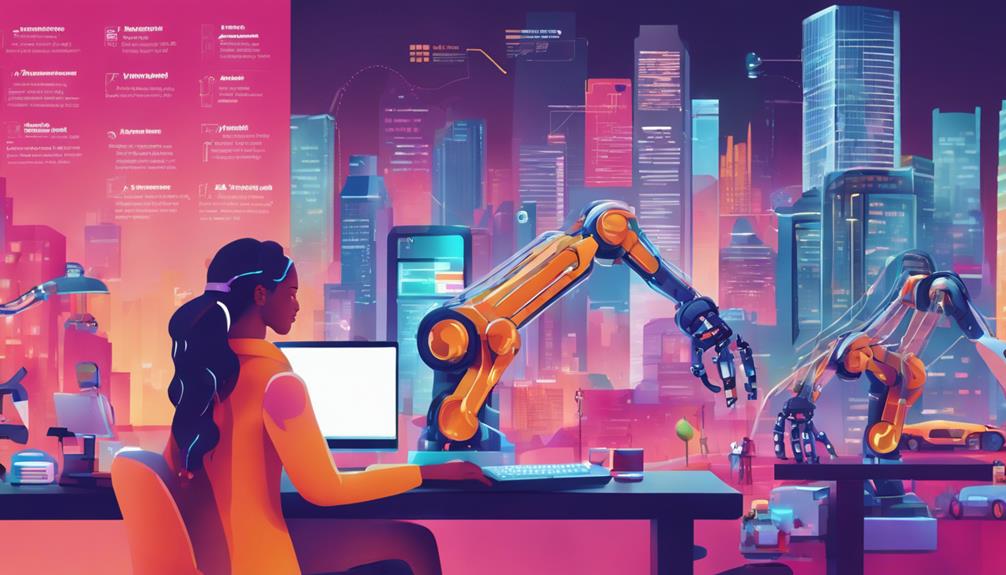The impact of AI on jobs is significant. It is estimated that by 2030, 300 million jobs worldwide could be replaced due to AI advancements. In the near future, around 85 million jobs may be displaced by 2025, affecting approximately 14% of the global workforce. In sectors such as customer service, numerous positions are being automated, leading to companies considering layoffs due to AI implementation. Despite the challenges posed by automation, new job opportunities are arising in AI-related fields. If you are interested in knowing which specific roles are expanding and how to adapt, you may consider delving deeper into the details.
Types of AI Jobs

When you think about the landscape of AI jobs, several key roles come to mind.
Machine learning engineers design algorithms that power AI systems, while customer service specialists guarantee smooth interactions between users and technology.
Leadership in AI development and ethics compliance officers are also essential, guiding the responsible use of AI in various sectors.
Machine Learning Engineers
Machine learning engineers play an essential role in the AI landscape by designing and implementing algorithms that enable computers to learn from data and make informed predictions. As AI technologies continue to advance, the demand for machine learning engineers is surging. Employment opportunities in this field are projected to grow by 22% by 2030, making it one of the most promising career paths in the job market today.
In 2023, machine learning engineers rank among the top 10 most sought-after tech roles, highlighting their importance in various industries. To thrive in this role, you'll need proficiency in programming languages like Python and R, alongside a strong foundation in statistics and data analysis. These skills are essential for developing effective AI models that drive innovation.
The financial rewards for machine learning engineers are significant, with an average salary of around $112,000 per year in the U.S. This lucrative career path not only offers a chance to work at the forefront of artificial intelligence but also provides a fulfilling opportunity to impact how businesses leverage data.
AI Customer Service Specialists
Transforming the landscape of customer support, AI customer service specialists, such as chatbots and virtual assistants, are automating responses and handling inquiries that once required human agents. This shift towards AI technologies has led to significant job displacement, with about 23.5% of U.S. companies replacing their human customer support roles.
As these tools streamline interactions, they improve efficiency in service delivery, but the downside is the growing vulnerability of customer service jobs to automation. In sectors like the travel industry, traditional roles are rapidly disappearing. With AI enhancing online booking platforms, the demand for human travel advisors has significantly decreased.
As AI continues to evolve, your reliance on automated customer service solutions is expected to grow, which means fewer opportunities for human representatives. In this new landscape, understanding how AI impacts customer service is essential.
While automation offers benefits like quicker responses and reduced costs, it also raises concerns about job security and the future of human agents in this field. As you navigate this transformation, consider how these changes might affect your work and the overall customer experience.
Leadership in AI Development
Leadership in AI development encompasses a variety of roles, each critical in shaping the future of technology and driving innovation within organizations. As AI adoption accelerates, business leaders must navigate the delicate balance between embracing automation and managing potential job losses. With 50% of businesses integrating AI into their operations, it's clear that AI is reshaping the technology sector.
However, this shift brings challenges. Companies anticipate significant changes in job roles, with 44% expecting layoffs in 2024 due to automation. This underscores the necessity for proactive reskilling initiatives. Business leaders need to prioritize the development of new skills related to AI, as 75% of CEOs foresee a demand for such training in their organizations.
IT professionals are leading the charge, with 54% incorporating AI technologies into their work. By fostering a culture that embraces learning and adaptation, you can mitigate the impact of job losses while positioning your workforce for success in an AI-driven landscape. Ultimately, effective leadership in AI development isn't just about technology; it's about empowering people to thrive alongside it.
AI Ethics Compliance Officers
AI Ethics Compliance Officers play an essential role in ensuring that AI systems align with ethical guidelines and regulations as organizations increasingly adopt these technologies. With the rise of AI adoption, there's a growing demand for professionals who can navigate the complex ethical landscapes that accompany AI deployment.
In this role, you'll conduct audits and assessments to evaluate AI algorithms for bias and fairness, promoting the responsible use of AI in the workplace. Companies recognize the importance of having experts who can address ethical considerations, making this a critical area of focus.
As businesses integrate AI solutions, the job market for AI Ethics Compliance Officers is expanding rapidly. By 2030, it's likely that this position will become standard in many organizations, reflecting a commitment to ethical AI practices and accountability.
You'll find that organizations are increasingly prioritizing compliance with ethical guidelines to build trust with customers and stakeholders.
Skills Required for AI Jobs

To thrive in AI jobs, you need a mix of technical and interpersonal skills.
Proficiency in programming languages and data interpretation is essential, but don't underestimate the value of emotional intelligence in your role.
As you navigate this evolving landscape, focusing on these skills will keep you competitive and ready for the challenges ahead.
Programming Languages Proficiency
Proficiency in programming languages like Python, R, and Java is key for landing many AI jobs, as these tools are integral for developing machine learning algorithms and analyzing data.
Python stands out due to its simplicity and robust libraries, such as TensorFlow and PyTorch, which make it a favorite in the AI community. If you're aspiring to break into the field, mastering Python is a must.
Additionally, knowledge of SQL is essential for AI roles that require handling large datasets. Being able to query and manipulate data efficiently can set you apart from other candidates. Familiarity with other programming languages like Julia and Scala is increasingly valuable as they're becoming popular for high-performance numerical computing and big data applications in AI.
To excel in an AI-related career, you should also have a solid understanding of data structures and algorithms. These concepts are fundamental for creating effective machine learning models and solving complex problems.
Data Interpretation Expertise
Data interpretation skills are essential for professionals maneuvering the complexities of AI roles, as they must analyze large datasets to extract valuable insights that drive decision-making. Proficiency in statistical analysis is important; about 75% of organizations highlight the need for strong quantitative skills among employees. This competence enables you to effectively interact with AI technologies and make data-driven decisions.
Additionally, familiarity with data visualization tools is increasingly significant. A significant 83% of companies utilize visual representations to communicate findings derived from AI-driven analyses, making it crucial for you to master these tools. Understanding machine learning algorithms is also key, as over 60% of AI roles require professionals to interpret model outputs and assess their business implications.
Moreover, continuous learning in data science and analytics is necessary to keep pace with evolving technologies. With an estimated 120 million workers expected to undergo retraining in digital skills over the next three years, it's imperative that you commit to enhancing your expertise in data interpretation. This proactive approach will help you remain relevant in an AI-centric job market and excel in your career.
Emotional Intelligence in AI Roles
Emotional intelligence is becoming an essential skill in AI roles, as it helps you manage relationships and navigate complex interactions in fields like healthcare and education.
As AI integration expands, 75% of CEOs recognize the need for new skills, emphasizing the significance of soft skills alongside technical skills in the workforce. Professions resilient to automation, such as teachers, psychologists, and HR managers, rely heavily on emotional intelligence to handle intricate human interactions and make informed decisions.
With the evolution of AI technologies, there's a growing demand for professionals who can effectively blend technical skills with emotional intelligence. It's estimated that 120 million workers will need retraining to meet these new expectations.
Emotional intelligence fosters collaboration and enhances communication within teams implementing AI solutions, making it a crucial component for successful AI adoption.
Education and Training for AI Jobs

As AI continues to transform the job landscape, you might find exciting new opportunities emerging in this field.
Getting a solid foundation in computer science and engineering, along with pursuing AI certifications from top universities, can set you apart.
With the right education and training, you'll be well-equipped to thrive in an AI-driven workforce.
Emerging AI Job Opportunities
Emerging AI job opportunities are transforming the landscape of education and training, urging workers to acquire new skills that align with technological advancements. As the job market evolves, you'll find a growing demand for AI-related skills. By 2030, an estimated 120 million workers will need retraining to adapt to changes brought about by AI technologies.
Companies are recognizing this need, with 34% actively investing in upskilling and reskilling programs for their employees to guarantee they're equipped for the future. Educational programs like BBA and MBA in AI are emerging, providing you with essential knowledge to thrive in this new environment.
Lifelong learning is becoming vital; 75% of CEOs agree that new skills will be necessary due to AI integration in the workforce. To remain competitive, you must focus on developing your expertise in areas that complement AI technologies.
Embracing these emerging jobs not only helps you adapt to changes but also positions you favorably in a rapidly advancing job market. By committing to continuous learning, you'll be well-prepared to seize these opportunities and shape your career in the age of AI.
Computer Science and Engineering
Computer science and engineering programs are essential for anyone looking to thrive in the AI job market. With the rise of AI automation, the demand for skilled professionals is skyrocketing. Pursuing a degree in computer science or engineering equips you with the technical expertise needed for future roles in AI, especially in areas like machine learning and data science.
As you commence on this journey, remember that continuous upskilling is key. A staggering 75% of CEOs anticipate a need for new skills as AI integration accelerates. Staying competitive means embracing lifelong learning initiatives—whether through online courses, workshops, or specialized training programs. These resources not only enhance your knowledge but also keep you updated with the latest developments in AI technologies.
Focusing on specialized training in machine learning, data science, and software development will prepare you for high-demand jobs in the AI sector. By honing your skills and staying committed to learning, you can position yourself as a valuable asset in a rapidly changing job landscape shaped by AI automation.
AI Certifications From Top Universities
Top universities are now offering AI certifications that provide essential skills for maneuvering the evolving job market influenced by AI technologies. Institutions like Stanford, MIT, and Harvard have launched online programs focusing on machine learning, data science, and AI ethics, ensuring you gain the knowledge required to stand out.
With 120 million workers expected to undergo retraining in AI-related skills within the next three years, these certifications are becoming increasingly crucial. By pursuing AI certifications from top universities, you'll enhance your employability in a competitive landscape where companies actively seek candidates with specialized AI expertise.
The emphasis on continuous skill development means you can engage in lifelong learning while balancing your current job. Flexible online programs make it easier than ever to fit your education into a busy schedule, allowing you to upskill without disrupting your career.
As the demand for AI knowledge continues to rise, investing in training through reputable institutions is a smart move. You'll not only increase your chances of landing a job in AI but also position yourself for future advancements in this rapidly changing field.
Tech Companies Seeking AI Talent

Tech companies are racing to find AI talent as they integrate advanced technologies into their operations to boost automation and efficiency. With 50% of businesses already using AI and 77% exploring its potential, the demand for AI-related skills is skyrocketing. Larger enterprises are particularly aggressive in their pursuit, being twice as likely to adopt AI compared to smaller firms.
The technology sector has faced significant job cuts, totaling 136,831 in 2023. This has created a pressing need for AI professionals who can fill the gaps left by layoffs. As companies ramp up their automation efforts, they're increasingly prioritizing the recruitment of individuals skilled in AI.
To meet this growing demand, many organizations are investing in upskilling and reskilling their workforce. About 120 million individuals will need retraining to adapt to advancements in AI technologies. IT professionals, in particular, are leading the charge, with 54% incorporating AI into their work. This shift not only highlights the necessity for AI talent but also underscores the importance of continuous learning in a rapidly evolving job market.
Remote AI Jobs

Remote AI jobs offer you the flexibility to work from anywhere, but they also come with risks of isolation.
You can leverage online job platforms to find opportunities, yet it's essential to balance the benefits of remote work with the potential downsides.
As you navigate this evolving landscape, understanding these dynamics can help you make informed career choices.
Flexibility Versus Isolation Risks
Balancing the flexibility of remote AI jobs with the isolation risks they pose can be a challenging endeavor for many workers. While remote work offers the freedom to choose your hours and location, it can also lead to feelings of isolation and disconnection from your colleagues. This lack of team cohesion is essential for effective collaboration, making it imperative to address these challenges.
Moreover, about 30% of workers worry about job replacement due to technology, which can heighten feelings of insecurity and isolation. To combat this, companies need to prioritize regular communication and foster virtual team bonding. By creating opportunities for interaction, you can enhance emotional intelligence within your team and strengthen relationships.
As AI progresses, the demand for jobs requiring interpersonal skills will likely increase. Maintaining social connections in a remote environment not only helps mitigate isolation but also reinforces the value of human interaction in an increasingly automated world.
Ultimately, finding a balance between the flexibility of remote AI jobs and the risks of isolation is crucial for both personal well-being and professional effectiveness.
Leverage Online Job Platforms
As workers navigate the challenges of isolation in remote setups, online job platforms have emerged as key resources for finding AI-related roles that match their skills and aspirations. With 77% of businesses exploring or integrating AI technologies, the demand for AI-related skills is skyrocketing. This trend makes these platforms essential for job seekers looking to shift into AI roles or to discover remote job opportunities in this fast-evolving field.
As you seek new positions, remember that approximately 120 million workers will undergo retraining in the next three years. Online job platforms not only list job openings but also provide access to training resources necessary for acquiring AI-related skills. Industries like marketing and technology, which have high AI adoption rates of 37% and 35%, respectively, rely heavily on these platforms to recruit talent.
Given that automation could impact 300 million jobs globally, online job platforms can serve as a crucial bridge for those facing job displacement due to AI. By leveraging these resources, you can better navigate the changing job landscape, find relevant opportunities, and secure a place in the future workforce.
AI Job Growth Projections

As you explore AI job growth projections, you'll notice the dynamic shifts in the job market.
Trends indicate not just job losses but also significant opportunities in emerging sectors, especially in major cities.
Understanding these changes can help you navigate your career path in this evolving landscape.
AI Job Market Dynamics
AI is reshaping the job market, with projections indicating significant job growth alongside notable displacement by 2030. It's expected that approximately 300 million jobs globally will be replaced by AI, which accounts for about 9.1% of all jobs worldwide.
By 2025, around 85 million jobs will be displaced due to advancements in job automation, highlighting the immediate impact of AI. A workers report from Goldman Sachs reveals that 25% of tasks in the U.S. and Europe are vulnerable to AI automation, affecting various sectors.
Moreover, about 44% of companies anticipate layoffs due to AI in 2024, signaling the ongoing job losses that technology adoption can bring.
However, it's not all doom and gloom. Projections suggest that while AI is replacing jobs, new jobs will emerge, with estimates indicating that 8-9% of roles expected by 2030 may not even exist today.
This duality of job displacement and creation emphasizes the need for workers to adapt and upskill, ensuring they remain relevant in a rapidly changing landscape driven by the impact of AI.
AI Job Growth Trends
The job landscape is evolving rapidly, with projections indicating significant growth in roles directly related to AI and automation by 2030. While it's estimated that about 300 million full-time jobs could be replaced globally, this also opens doors for new opportunities in the AI sector. As AI adoption surges—77% of companies are already using or considering AI—there's a clear trend toward automation across various industries.
However, you should be aware that this shift will lead to job losses, especially in high-risk sectors like manufacturing and retail. By 2025, around 85 million jobs may be displaced, affecting 14% of the global workforce. This highlights the urgent need for workforce reskilling initiatives to prepare you for the evolving job market.
Companies will likely require a workforce skilled in AI-related roles, which means those who adapt and reskill will find new opportunities. As you navigate this changing landscape, keeping an eye on AI job growth trends will be essential in securing your place in the future workforce.
Embracing change now can position you for success amid the inevitable shifts brought by AI and automation.
AI Job Hubs: Major Cities
Major cities around the globe are rapidly transforming into thriving AI job hubs, with significant growth projections for employment opportunities in this sector.
In San Francisco, you'll find a remarkable 35% increase in AI job postings over the past year, making it a key player in the AI landscape.
London is set to become a leading AI job hub in Europe, with a projected 20% rise in job opportunities by 2025.
Meanwhile, Bengaluru, often hailed as India's tech capital, anticipates a 25% annual growth in AI job openings, driven by a surge in AI start-ups and established companies embracing AI technologies.
Toronto is also making strides, with a projected 30% increase in AI job demand over the next three years, thanks to robust investments in AI research and development.
Other cities, like Seattle and Chicago, aren't far behind, expecting a 15% rise in AI-related employment opportunities by 2026.
As you can see, the global landscape for AI job hubs is expanding rapidly, providing you with numerous job opportunities in this exciting field.
Salaries and Compensation

When you look at AI job salaries, you'll notice a wide range depending on industry demand.
Some sectors pay well for specialized roles, while others struggle to keep wages competitive due to automation.
Understanding these dynamics can help you navigate your career choices in an evolving job market.
Typical AI Job Salaries
AI job salaries vary widely, reflecting the significant impact of automation on compensation across different sectors.
You'll notice that lower-skilled jobs have faced substantial wage decreases, with reductions of up to 70% since 1980. This decline is especially pronounced in blue-collar roles, where earnings have dropped by 50% to 70%. As AI continues to automate tasks, you may encounter increased job losses, particularly in industries heavily reliant on routine work.
On the flip side, high-income jobs, particularly in tech, have remained somewhat insulated from these wage impacts. However, the ongoing adoption of AI raises concerns about widening economic disparities. In 2023 alone, the tech sector reported over 136,000 job cuts, highlighting the significant shifts in compensation structures driven by AI.
Interestingly, positions that require human interaction, like those in healthcare and education, are less likely to see drastic salary cuts compared to more automatable sectors.
As you navigate the evolving job market, understanding these trends in AI job salaries will be essential for making informed career decisions.
Industry Demand Variability
Industry demand for various roles fluctuates considerably, leading to stark differences in salaries and compensation across sectors.
The impact of AI technology and automation is particularly pronounced, with wages declining by up to 70% since 1980 for lower-skilled jobs. This decline not only compresses wage structures but also contributes to rising income inequality, as job losses in sectors like tech—evidenced by 136,831 layoffs in 2023—reflect the variability in compensation.
High-income jobs tend to remain insulated from wage impacts, while lower-income positions feel the brunt of economic shifts. As businesses adopt AI, they anticipate increased wage pressure in roles with high automation potential, further complicating salary dynamics. The economic benefits of AI are expected to be unevenly distributed, leaving many blue-collar workers grappling with a staggering 50-70% decrease in wages.
In this landscape, understanding how industry demand directly affects compensation is essential.
How to Prepare for an AI Job

To prepare for an AI job, you need to showcase your project experiences and build professional relationships focused on AI.
You should also practice nailing those AI interview questions to stand out from the competition.
Showcase AI Project Experiences
How can you showcase your AI project experiences effectively to stand out in a rapidly evolving job market? With AI adoption accelerating, it's essential to highlight your relevant skills and projects. Start by detailing specific projects where you contributed to automation or enhanced processes using AI technology. This illustrates not only your technical ability but also your understanding of the impact AI has on job roles.
Consider creating a portfolio that includes case studies, code samples, or presentations that exemplify your work. Be sure to explain your role, the challenges you faced, and the outcomes achieved. This approach will help potential employers see the value you bring, especially as many industries face job losses due to AI.
Upskilling is crucial in this landscape. Mention any relevant courses, certifications, or workshops you've completed to further your expertise. Highlighting your commitment to continuous learning shows that you're proactive about adapting to changes in the workforce.
Building Ai-Focused Professional Relationships
Building connections with professionals in AI can open doors to opportunities and insights that will help you navigate your career path in this rapidly changing landscape. Engaging in effective networking is key to becoming AI-literate, as 50% of businesses have already integrated AI into their operations. By connecting with industry experts, you'll gain valuable knowledge about the skills in demand, including data analysis, programming, and digital marketing.
To stay competitive, focus on lifelong learning and continuous upskilling. Consider participating in online educational programs in AI management or data science. These can equip you with the technical skills necessary to excel in an AI-driven job market.
Remember, while technical skills are vital, soft skills like communication and emotional intelligence are equally important. They're essential for roles that require human interaction and are less likely to be automated by AI technologies.
Ultimately, building AI-focused professional relationships will enhance your knowledge and increase your chances of landing a fulfilling position in this evolving landscape. Stay proactive in networking, and don't hesitate to seek mentorship from those already established in the field.
Nailing AI Interview Questions
Preparing for an AI job interview involves understanding the latest trends in the industry and showcasing your adaptability to new technologies. With AI potentially replacing 300 million jobs globally, it's essential to highlight your relevant skills and training.
As you prepare, focus on specific AI tools and applications that pertain to the role you're applying for, especially since sectors like marketing and technology show a strong demand for AI expertise. Demonstrate your ability to leverage AI for improved efficiency, as 81% of office workers view it positively.
Employers are increasingly looking for candidates who can integrate AI into their workflows. Be ready to discuss the ethical implications of AI, as many workers express concerns about adequate training for digital skills.
Stay informed about the fact that 75% of CEOs expect a shift in workforce skills due to AI integration. This prepares you to articulate your willingness to learn and adapt.
Frequently Asked Questions
How Many Jobs Has AI Replaced in Statistics?
You're curious about AI's impact on jobs. While exact statistics vary, it's clear that significant job losses are occurring, especially in industries like manufacturing and customer service, where automation is increasingly taking over repetitive tasks.
How Many Jobs Were Lost Due to Ai?
You might be surprised to learn that AI's impact on the job market is growing. Currently, around 3,900 jobs in the U.S. are linked to AI-related losses, indicating a significant shift in employment dynamics.
What Jobs Are Being Replaced by Ai?
AI's replacing various jobs, especially in customer support, travel, and manufacturing. You might find roles like data entry and administrative positions particularly vulnerable, as automation continues to streamline processes and enhance efficiency across industries.
How Many Jobs Will AI Replace by 2030?
By 2030, you'll see AI replacing about 300 million jobs globally, impacting roughly 9.1% of positions. It's essential to adapt and consider new skills or career paths to stay relevant in this evolving job market.
Conclusion
To sum up, the rise of AI has certainly transformed the job landscape, replacing certain roles while creating new opportunities.
By understanding the types of AI jobs available and the skills needed, you can position yourself for success in this evolving field.
As companies seek talented individuals, investing in education and training will pay off.
Stay proactive in your career development, and you'll be well-prepared to thrive in the exciting world of AI.









